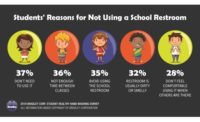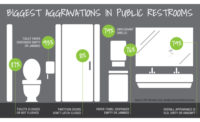One in two Americans are willing to ante up more cash at businesses that have clean, well-maintained restrooms, according to the 10th Annual Healthy Hand Washing Survey by Bradley Corp. The number of those who will “definitely” or “probably” spend more money has hiked up seven points to 52% this year compared to 45% in 2018.
In addition, 64% of consumers make a conscious decision to choose a business based on the fact that it has cleaner, well-maintained restrooms. Women are even more likely to be drawn to pleasing restrooms compared to men (67% vs. 61%).
In fact, clean restrooms are so desirable that one in three Americans say they’d pay to use a restroom if they were assured it was clean and well-stocked.
“Consistently, over the 10 years of our survey, a large majority of Americans say they expect a high quality business to have a high quality restroom,” said Jon Dommisse, director of strategy and corporate development for Bradley Corp. “So, when a customer encounters a messy restroom, their perception of that business and its products and services are tarnished. Even worse, 55% are unlikely to return to a business after a bad restroom experience, which can have a devastating effect on sales.”
“On the flip side, well-maintained restrooms attract customers who reward those businesses with increased spending. It simply makes good business sense to keep restrooms clean and modern-looking so customers come back.”
Coming clean on restroom uses and requests
“Nearly 60% of Americans tell us that, on average, they use public restrooms anywhere from one to five times per week, and an additional 21% use restrooms six or more times a week,” Dommisse said. “In all, 80% of people regularly use public restrooms. As odd as it may sound, for many of us, public restrooms are an important part of our everyday lives.”
Public restrooms also provide functional space beyond the necessities of using the toilet and washing hands. Almost half of adults utilize restrooms to check their appearance and 40% blow their nose or cough. Interestingly, 27% regard restrooms as a respite or getaway. They visit the restroom to avoid someone, cry, hide or take a mental health break. Another 25% use their cellphone in restrooms.
Despite visiting restrooms regularly, Americans report an increasingly high degree of aggravation with them. Their top aggravations include toilets that are clogged or not flushed (85%), empty or jammed toilet paper dispensers (83%), and partition doors that don’t latch (78%). In all, nearly 70% of Americans reported having an unpleasant restroom experience.
“Based on these pain points, it makes sense that American’s top requests for improvements are keeping restrooms cleaner and better stocked,” Dommisse said.
“The state of a restroom can have a measurable effect on the health of a business. Our aim for this research over the past 10 years has been to understand hand washing habits and help businesses improve their restrooms and attract repeat customers.”
The 10th Annual Healthy Hand Washing Survey by Bradley Corp. queried 1,264 American adults online Jan. 3-9, 2019, about their hand washing habits in public restrooms and concerns about germs, colds and the flu. Participants were from around the country, were 18 years and older, and were fairly evenly split between men and women (49 and 51%).









